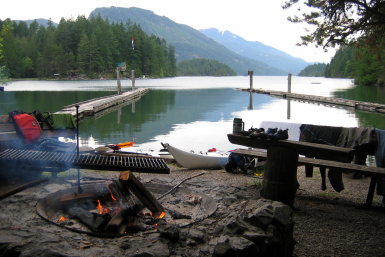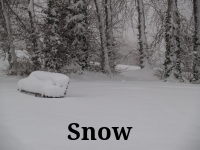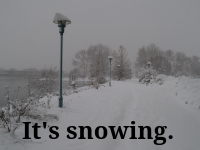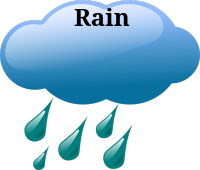レッスン 10 - Past Tense
会話

English
Eric phones Tom to tell him about his vacation at a nearby lake.
Eric: Hi Tom. How's it going?
Tom: Good. How was your vacation?
Eric: Great! We went hiking in the forest, and kayaking around the lake. We were very lucky with the weather, it was sunny and warm every day.
Tom: How many people were there?
Eric: There were five of us.
Tom: Where did you stay?
Eric: We rented a cabin at the south end of the lake. It was right on the lake, with a small beach in front. It came with a kayak and wood for the fire pit on the beach. I had such a great time that I want to go again next summer. Maybe you can come with us next time.
Tom: That sounds great!
語彙と例文
 How many people were there?
How many people were there?
|
何人の人がいましたか? |
 at a nearby lake
at a nearby lake
|
近くの湖の隣 |
 We went hiking in the forest, and kayaking around the lake.
We went hiking in the forest, and kayaking around the lake.
|
私たちは森でハイキングに行き、湖の周りをカヤックに行きました。 |
 beach
beach
|
ビーチ |
 cabin
cabin
|
キャビン |
 to phone
to phone
|
電話する |
 to tell
to tell
|
伝える, 言う |
 fire pit
fire pit
|
ファイアピット |
 kayak
kayak
|
カヤック |
 lucky
lucky
|
ラッキー |
 to rent
to rent
|
借りる |
 to come with
to come with
|
伴う |
 south
south
|
南 |
 to stay
to stay
|
とどまる, 留まる |
 vacation
vacation
|
バケーション |
 wood
wood
|
木材 |
広告
Weather
 weather
weather
|
天候 |
 cloud
cloud
|
雲 |
 heat
heat
|
熱 |
 rain
rain
|
雨 |
 snow
snow
|
雪 |
 storm
storm
|
嵐 |
 sun
sun
|
雪 |
 wind
wind
|
風 |
 How's the weather?
How's the weather?
|
どんな天気ですか? |
 It's a beautiful day.
It's a beautiful day.
|
美しい日です。 |
 It's cold.
It's cold.
|
寒いです。 |
 It's cool outside.
It's cool outside.
|
外は寒いです。 |
 It's foggy.
It's foggy.
|
霧がかかっています。 |
 It's hot.
It's hot.
|
暑いです。 |
 It's humid.
It's humid.
|
湿度が高い。 |
 It's raining.
It's raining.
|
雨が降っています。 |
 It's snowing.
It's snowing.
|
雪が降っています。 |
 It's stormy.
It's stormy.
|
嵐です。 |
 It's sunny.
It's sunny.
|
晴れです。 |
 It's windy.
It's windy.
|
風が強いです。 |
 It's very windy today.
It's very windy today.
|
今日はとても風が強いです。 |
 The weather's bad.
The weather's bad.
|
天気は悪い。 |
 The weather's nice.
The weather's nice.
|
天気はいいです。 |
 It's supposed to be nice tomorrow.
It's supposed to be nice tomorrow.
|
天気は明日いいと思われます。 |





文法
Past Tense of Verbs
The past tense of verbs, also called the simple past tense, describes a past action, event, or emotional state. Most verbs form the past tense by adding the suffix ed to the end of a verb. For example the past tense of walk is walked.
例
| I walked to the park yesterday. | 昨日公園に歩いた。 |
| She talked about her vacation. | 彼女は彼女の休暇について話しました。 |
| He closed the door. | 彼はドアを閉めた。 |
| They talked about the cabin. | 彼らはキャビンについて話しました。 |
| We hoped for the best. | 私たちは最高のことを願っていました。 |
| The clouds drifted away. | 雲は浮かんでいた。 |
Irregular Verbs in the Past Tense
Many very common verbs in English have an irregular past tense. This lesson will cover a few of these very common irregular verbs. The next lesson will cover some more irregular verbs as well.
To Be
The verb be is the most irregular verb in English. It has two forms in the past tense. The following table shows the past tense for the verb be.
| I was | |
| he was | |
| she was | |
| it was | |
| we were | |
| you were | |
| they were |
例
| I was at the store. | 私は店にいました。 |
| He was tired. | 彼は疲れていた。 |
| They were happy. | 彼らは幸せだった。 |
| We were at home. | 私たちは家にいました。 |
| Were they at the beach? | 彼らはビーチにいましたか? |
| They were not at the beach. | 彼らはビーチにいませんでした。 |
| The car was dirty. | 車は汚れていました。 |
| The windows were dirty. | 窓は汚れていました。 |
Other Irregular Verbs
The following table shows some very common verbs that are irregular in the past tense. Lesson 11 will cover even more irregular verbs.
| Verb | Past Tense | |
|---|---|---|
| do | did | 行う |
| have | had | 持つ |
| go | went | 行く |
| sleep | slept | 眠る |
| come | came | 来る |
| give | gave | 与える |
| find | found | 見附る |
| think | thought | 考えます, 考える |
例
| They went to the store last week. | 彼らは先週店に行きました。 |
| He thought about it. | 彼はそれについて考えました。 |
| I slept all night. | 私は一晩中眠りました。 |
| We did the work. | 私たちは仕事をしました。 |
| They found it. | 彼らはそれを見つけました。 |
| She found the book. | 彼女は本を見つけました。 |
| I did the dishes. | 私は皿を洗った。 |
| They slept on the floor. | 彼らは床で眠りました。 |
Questions and Negative Statements with the Past Tense
For both questions and negative statements, the past tense of the helper verb do is used along with the main verb, similar to how do is used as a helper verb when asking questions or making negative statements in the present tense.
音符: Did not is often shortened to didn't.
例
| Did they go to the store? | 彼らは店に行きましたか? |
| They did not go to the store. | 彼らは店に行きませんでした。 |
| They didn't go to the store. | 彼らは店に行きませんでした。 |
| Did you sleep all night? | 一晩中眠りましたか? |
| I did not sleep all night. | 私は一晩中眠りませんでした。 |
| Did she find the book? | 彼女は本を見つけましたか? |
| She did not find the book. | 彼女は本を見つけませんでした。 |
| Did you buy it? | 購入しましたか? |
| We did not buy it. | 私たちはそれを買わなかった。 |
| They did not do it. | 彼らはそれをしなかった。 |
A very small number of verbs, such as be, do not use a helper verb when asking a question or making a negative statement. The following examples show how to ask questions and make negative statements with the verb be.
| Were you tired? | 疲れていましたか? |
| I was not tired. | 私は疲れていませんでした。 |
| I wasn't tired. | 私は疲れていませんでした。 |
| Was the house for sale? | 家は売りに出されていましたか? |
| The house was not for sale. | 家は売りに出されていませんでした。 |
| The house wasn't for sale. | 家は売りに出されていませんでした。 |
| Were the dishes clean? | プレートは洗浄されましたか? |
| The dishes were not clean. | プレートは洗浄されませんでした。 |
| The dishes weren't clean. | プレートは洗浄されませんでした。 |
広告
英語を読む
Chapter 1 - The Airport
Ana and Alejandro Martinez walk off the plane and into the airport. Both are tired from the flight, but also excited to be in a new country. They follow the crowd of people until they get to the lineup for customs. After about ten minutes, it is their turn to talk with the customs agent.
"Hello," Ana says as she gives the customs officer her passport.
"What is the purpose of your visit?" asks the customs officer.
"We are taking a course to help us improve our English."
"How long will you be staying in Vancouver?"
"We plan to stay until September fifth."
"Where are you staying?"
"We have friends who live here," Alejandro answered. "We met them when they visited our country. They invited us to stay with them for the summer, and recommended a course for us to take."
"What is your relationship?"
"Ana is my sister," Alejandro replied.
The customs officer gave them back their passports and said, "Enjoy your stay."
"Thank you", Ana and Alejandro said at the same time, then went to find their luggage.
They stood by the luggage carousel and waited for their luggage. "Is that your suitcase?" Ana said pointing at a black suitcase.
Alejandro looked at it. "I don't think so, but here is yours."
Ana grabbed her suitcase as it came by. A couple minutes later Alejandro got his suitcase as well.
"Now where do we go?", Ana asked.
"I think we need to go this way," Alejandro replied, pointing to the left.
They walked through a small passage and into a large waiting area.
"Alejandro! Ana!" they heard someone call.
Ana and Alejandro looked and saw their friends Sarah and Eric. They waved and walked over to them.
"Hi!" Sarah said. "How was the flight?"
"Long," said Alejandro. "But there were no problems."
"Let's go," Eric said, "We'll take you back to our house, and make dinner while you get settled in."
The four of them walked out of the airport, and into the sunny evening.
語彙
| plane | 飛行機 |
| airport | 空港 |
| tired | 疲れた |
| flight | 飛翔, 飛行機飛行 |
| excited | 発奮 |
| country | 国 |
| crowd | 群集 |
| lineup | ラインナップ |
| customs | 国境管理 |
| minute | 分 |
| purpose | 目的 |
| visit | 訪問 |
| improve | より良くする, 良くする |
| until | 迄 |
| answers | 答える |
| summer | 夏 |
| recommended | 勧める |
| relationship | 関係 |
| Enjoy your stay. | 滞在を楽しんで。 |
| luggage | 荷物 |
| suitcase | スーツケース |
| grabbed | 掴む |
| pointing | ポイントする |
| passage | 通路 |
| get settled in | 家で自分自身を作ってください |
稽古
「the past tense」を使用するように各文を変更します。
Example - Question: I do the work. Answer: I did the work.
| I want to go to the store. | |
| The boy is sad. | |
| She doesn't want a coffee. | |
| Do you have a pen? | |
| They walk to the park. |
お気に入りの休暇、またはあなたが持ちたい休暇について書いてください。
クイズ
Do the online quiz to see how well you know the past tense of verbs in English.

